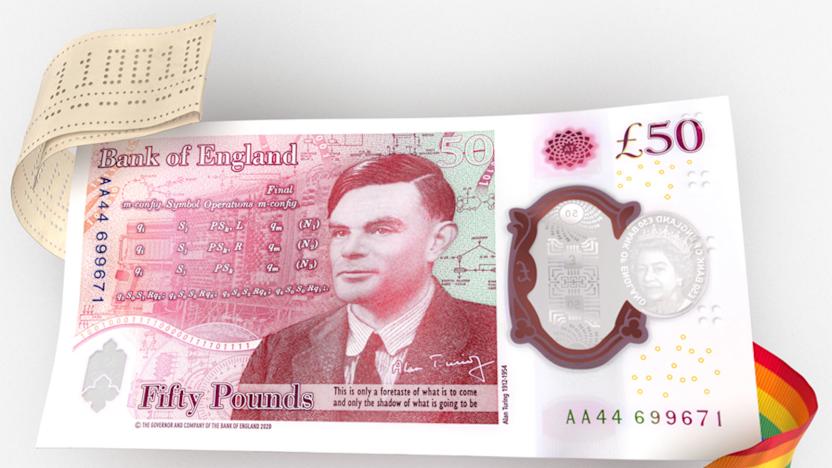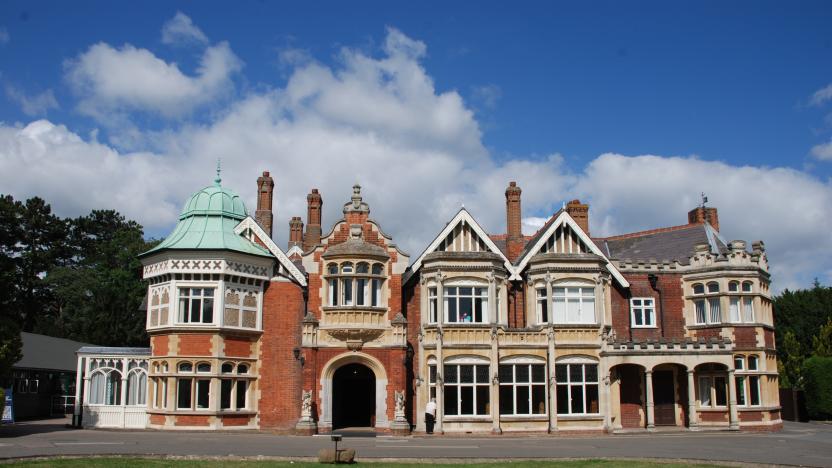Alan Turing
Latest

The UK's Alan Turing £50 bank note is a love letter to coding
The UK has unveiled its £50 Alan Turing bank note, and it's appropriately both very secure and a nod to the computer scientist's achievements.

Facebook donates £1 million to WWII code-breaking site Bletchley Park
Bletchley Park was the site where Alan Turing and his World War II team of code-breakers cracked Germany’s Enigma machine and helped save the world from Nazi tyranny. The site is now a popular museum, but it’s facing a £2 million ($2.6 million) revenue shortfall due to the loss of tourism caused by the COVID-19 pandemic. Now, Facebook has announced that it will donate £1 million to the Bletchley Park Trust charity that runs the site.

The Bank of England will honor Alan Turing on its new £50 note
The Bank of England has chosen Alan Turing, computing pioneer and a code-cracker during World War Two, to be featured on its new £50 note. Turing contributed significantly to the field of mathematics, but his achievements were not fully recognized during his lifetime as he was gay, which was illegal at the time.

Turing Award winners include AI giants from Facebook and Google
The Turing Award has recognized some of the biggest names in AI and computing over the years, and the latest winners are particularly heavy hitters. The three prize recipients for 2018 are Google VP Geoffrey Hinton, Facebook's Yann LeCun (above) and Yoshua Bengio, the Scientific Director of the giant AI research center Mila. All three helped "develop conceptual foundations" for deep neural networks, according to the Association for Computing Machinery, and created breakthroughs that showed he "practical advantages" of the technology.

'The Imitation Game' puts the spotlight on Alan Turing and his groundbreaking machine
It is the height of the Second World War. A group of codebreakers stands in a dimly lit warehouse 50 miles northwest of London, a giant machine composed of spinning drums and wires looms in front of them. It's taken years of work -- as well as a few shouting matches -- to get the device assembled and ready to start sorting through 159 quintillion combinations in search of the one that will let the British crack the Germans' infamous Enigma machine. The switch is flipped and nine rows of drums begin spinning as the assembled group waits... and waits. It takes a while to go through each combination, and staring at the device has all the excitement of watching laundry spin in a dryer. Frustration quickly sets in and tensions mount, because for the team in The Imitation Game, guns and tanks are not the weapons they fear. Their enemy is time.

Google makes the 'Nobel Prize of computing' worth $1 million
The Association for Computing Machinery's A.M. Turing Award is often called the "Nobel Prize of computing." Every year since 1966 it's been awarded to an accomplished computer scientist or engineer like Douglas Engelbart, the inventor of the computer mouse. But chances are you've never heard of the award at all, despite it being named after legendary Allied Forces code-breaker Alan Turing. That's because it's never really been that big -- no huge sponsors meant it didn't get a lot of promotion, and the annual prize was limited to a relatively modest $250,000. That's about to change with the 2014 award thanks to the largess of Google. The company's been a co-sponsor of the award since 2007 alongside Intel, but now they're taking full control of the prize money, upping the package fourfold to a rather hefty $1 million.

Keeping your digital life safe in the age of surveillance
Like it or not, people are after your data. Whether it's for advertising, national security or other nefarious purposes, you're leaving a trail of digital breadcrumbs for anyone to follow. But there's a growing arsenal of affordable tools to help protect your privacy both digitally and physically. In this week's Rewind, we take a look at this age of surveillance and some of the more approachable gadgets designed to help fight back against prying eyes.

Chess and the Automaton Endgame
Welcome to Time Machines, where we offer up a selection of mechanical oddities, milestone gadgets and unique inventions to test out your tech-history skills. Machines may need to start a union. After all, various deep thinkers have been busy for more than a century dreaming up ways to impart human-like thought processes and capabilities into them, just so they can do more of our work. Familiar names in the annals of computing's history such as Charles Babbage and Alan Turing may stand out, but wedged between those figures on the historical timeline is the perhaps lesser-known Spanish inventor and engineer Leonardo Torres Quevedo. Of his many inventions, one of the most unique is "El Ajedrecista" (The Chess Player), which he presented to the Parisian public in 1914. It was a chess-playing automaton, programmed to stand against a human opponent and respond accordingly to any move they made. It knew if someone was trying to cheat, and took pride in moving its own playing pieces around the board. Most of all, it reveled in announcing a victory against its human taskmasters when it inevitably won the game.

Talking to Siri: Who's your daddy?
Everyone keeps asking Siri this. To be fair, Alan Turing is the honorary father of all virtual agents like Siri. Steven Sande and Erica Sadun have been working on the third edition of Talking to Siri, the book that covers all the ins and outs of everyone's favorite digital assistant.

Google's Turing doodle celebrates his genius, reminds us how dumb we are (video)
This week sees many corners of the globe celebrating the 100th anniversary of the birth of Alan Turing. A man whose contribution to the worlds of tech and gadgets is immeasurable -- a sentiment not lost on Google. Today, geeks and norms worldwide will be waking up to possibly the most complex doodle to date. Can you set the machine and spell out "Google"? If you can, you'll be sent off to lots more information about the man himself. This isn't the only thing Mountain View's done to keep his legacy alive, having previously helped Bletchley Park raise funds to purchase (and display) Turing's papers, and more recently helping curators at London's Science Museum with its Codebreaker - Alan Turing's Life and Legacy exhibition. If you haven't already, head to Google.com and pop your logic hat on, and if you get stuck, head past the break for a helpful video.

Alan Turing's breakthrough machine gets a loving Lego tribute (video)
In the world of technology, having one of your inventions rendered in Lego form is the equivalent of a musician being parodied by Weird Al -- it's a sign you've truly made it and tribute to your influence. So, we're more than a little surprised to see that it's taken this long for the Turing Machine to be lovingly built from plastic bricks. The heart of this simple logic device is a Lego Mindstorms NXT set, but the soul is in Alan Turing's genius -- a man who was before his time and unjustly persecuted for failing to properly fit into society's molds. Dutch researchers Jeroen van den Bosand and Davy Landman built the device as a tribute to Turing, who would have celebrated his 100th birthday this Saturday. If you're in Amsterdam you can see the machine yourself at Centrum Wiskunde & Informatica's Turings Erfenis exhibit. Or, you can watch the short explanatory video after the break.

Remembering Alan Turing at 100
Alan Turing would have turned 100 this week, an event that would have, no doubt, been greeted with all manner of pomp -- the centennial of a man whose mid-century concepts would set the stage for modern computing. Turing, of course, never made it that far, found dead at age 41 from cyanide poisoning, possibly self-inflicted. His story is that of a brilliant mind cut down in its prime for sad and ultimately baffling reasons, a man who accomplished so much in a short time and almost certainly would have had far more to give, if not for a society that couldn't accept him for who he was. The London-born computing pioneer's name is probably most immediately recognized in the form of the Turing Machine, the "automatic machine" he discussed in a 1936 paper and formally extrapolated over the years. The concept would help lay the foundation for future computer science, arguing that a simple machine, given enough tape (or, perhaps more appropriately in the modern sense, storage) could be used to solve complex equations. All that was needed as Turing laid it out, was a writing method, a way of manipulating what's written and a really long ream to write on. In order to increase the complexity, only the storage, not the machine, needs upgrading.

Google donates $850,000 to restore home of the codebreakers
Google has donated £550,000 ($850,000) towards the £15 million project to renovate Bletchley Park. The donation from Mountain View is part of a $100 million charitable program that's previously helped rescue Alan Turing's personal papers. The country estate is the former home of Station X and the British Government's Code and Cypher School, which was where the World War Two model of the Enigma Machine was decrypted. Turing, its most famous alumnus went on to pioneer computer science and artificial intelligence during his short life and the complex now houses the National Museum of Computing. Unfortunately the buildings are rapidly collapsing and enormous investment is still required to transform the site into a museum, attraction and fitting tribute to the work of the codebreakers.

Turing machine built from wood, scrap metal and magnets, 'geek' achievement unlocked (video)
We take it for granted nowadays that thumbnail-sized silicon chips can crunch through the most complex of calculations, but early last century, mathematical tasks were still being carried out by humans. It was around that time that one Alan Turing, Enigma code breaker and general computer science pioneer, came up with what was essentially a thought experiment, a mechanical machine capable of simulating and solving algorithms just like a grown-up CPU. Well, you know where this is going by now, one British software engineer decided to build just such a device, out of old bits and bobs he had lying around his geek lair, producing a working model that was recently shown off at the Maker Faire UK in Newcastle. The only downer, as he points out, is that it'd take "months to add two numbers together," but all good things start off humbly. Video after the break.

Britons build working replica of the Turing Bombe
Just in case Al Qaeda or other "evildoers" du jour decide to start communicating in code via the WWII-era Enigma code -- we'll have the Turing Bombe on our side. This working replica of the machine used by British cryptologists at Bletchley Park, the epicenter of the counter-Enigma effort was unveiled at that site earlier this week. According to an article by The Register: "The Bombes used 108 electromagnetic spinning drums to test combinations of letters and reveal the likely keys to the Enigma code used in a particular message." The article goes on to say that Churchill ordered the 200 Bombes that had been built dismantled by the end of the war, and that it wasn't until the 1970s that the classified nature of these devices was lifted. Unlike the shrouded secrecy that its original was wrapped in, this replica will be open to the public -- from September 23-24, there will be a reunion of Bletchley Park veterans and a special demonstrations with war re-enactors in period dress. No word on who will play Alan Turing, though, but our own England bureau chief, Conrad Quilty-Harper, is a likely candidate.[Via The Register]








